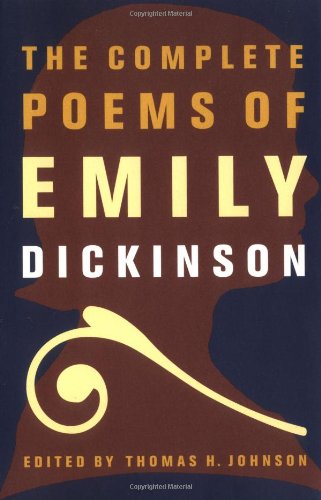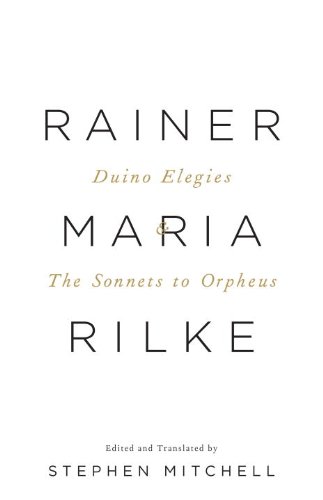April's poetry attempt, Emily Dickinson, fell by the wayside as I was very distracted by warm weather and gardening in May and couldn't get myself into the right mood for her angsty poetry. So instead I went with Walt Whitman, whose Leaves of Grass I had to read in school, but whose work I have never attempted as an adult. I'd still like to find the time to re-read Leaves of Grass, but this month I focused on Song of Myself and some later poems. I still don't feel like I have much of a grasp on him as an author because he was a novelist, essayist, and journalist, as well as a poet. Even if my exploration of his work is comparatively shallow, I did really enjoy what I read this month, possibly more than any other volume of poetry I've read so far this year...
April's (Failed) Attempt at Poetry: Emily Dickinson
So April's poetry selection did not go very well -- mostly in the sense that I never even cracked this thing open. As I've mentioned, the month of April was mostly a vacation from reading for me, and if I'm not motivated to read an Elena Ferrante novel, I'm certainly not motivated to read poetry, which is already a bit of a struggle. The saddest thing of all is that EdX had a course on Emily Dickinson that I signed up for and then failed to participate in, so this was actually a double failure. The questions now is whether I should shake it off and move on to some other poet who is perhaps more inspiring, or double-down and call Emily Dickinson my "April-May" poetry selection.
The Bookhive List: 'The Dream of a Common Language' by Adrienne Rich
I came to Adrienne Rich via Cheryl Strayed and Wild and while that is not necessarily something to brag about, I do think it would make Cheryl Strayed incredibly happy. Wild was about literature and grief as much as it was about hiking and recovery and her inclusion of the books that were meaningful to her at that point in her life seemed incredibly deliberate. Especially because she left her favorite quotes as her signature in all of the trail books, suggesting a desire to share her favorite authors with the world.
Anyway, I read The Dream of a Common Language because she made it sound so entrancing, and it was a rich and rewarding experience that I've already indulged in a few more times. Like Strayed, I feel a strong desire to take it with me. This is a book that will probably go on some camping trips this summer. It is deeply personal but somehow manages to be very political, a feat it pulls off so gracefully. If you haven't spent much time with contemporary or feminist poetry, this is the essential text (in my humble opinion) to get you started.
The Bookhive List is a weekly recommendation of my all-time favorite, must-read books.
March's Attempt at Poetry: 'Citizen' by Claudia Rankine and 'Prelude to Bruise' by Saeed Jones
This month I went in a completely different direction on the poetry front, and chose two recently published volumes of very critically-acclaimed and very contemporary poetry, Citizen: an American Lyric by Claudia Rankine, and Prelude to Bruise by Saeed Jones. Both are pretty quick read (100 pages each), and they pair really nicely together; although stylistically and structurally they are very different, they tread much of the same subject matter, namely race and identity (in the case of Prelude to Bruise, much of that identity is related to sexual and gender identity).
You shouldn't need my endorsement, because these were two of the most decorated books published in 2014, but I personally would recommend them to anyone who, like me, doesn't read much contemporary poetry. Reading them will also just make you a cooler/better person.
February's Attempt at Poetry: Robert Frost
Robert Frost is one of those poets who looms very large in the American consciousness, but no one actually seems to know that much about him or have read any of his books. I decided to get a complete collected volume, and to read each book chronologically as a distinct part. I tried whenever possible to read each individual book in one sitting, but the longer I went on, the more tedious that became. I started very strong, enjoying the experience very much, but it started to run together the further I went, and I think now the best approach is to focus on individual volumes, and spread the Robert Frost poetry out throughout your lifetime. Granted, that is not the goal of my reading poetry in 2015, but it's what I would suggest to anyone interested in Robert Frost.
It might seem counter-intuitive to read poems generally focused on farming and the natural world in February, but it's all been very top-of-mind, as February is really the time of year when I get most cabin fever-y and start the daydreaming/planning for my garden. Robert Frost is a nice accompaniment for seed catalogs, which I've been poring over, along with the writing of Annie Dillard, which I've been re-reading for a Bookhive List post later this week. Somehow it's all helped to keep me sane and focused on the warmer days ahead.
January's Attempt at Poetry: Rainer Maria Rilke
The introduction to my edition of Rilke's poetry states that entire books have been written solely about Rilke's Duino Elegies; if that's not a deterrent to reading poetry, I don't know what is, and that's coming from someone who is reading War and Peace for really unironic fun. But in keeping with my Reading Resolutions to both read more poetry and read more academic texts that I missed out on as an undergrad, I read the Duino Elegies all the same, knowing full-well that I was certainly missing something, but enjoying the experience all the same.
For one thing, you can read all ten elegies in a sitting, making this a relatively painless undertaking. I didn't study German in school, but I took a crash course on reading in college to help with my senior thesis research, and I still enjoy reading German whenever I get the chance (which is not often), especially something like this with a more archaic vocabulary. This is not any kind of humble brag because my German is terrible, but my point is that having the German and English texts side by side was actually quite engaging, and if you have even the most basic understanding of German, I recommend this style of translation.
Following Duino Elegies, I read Sonnets to Orpheus, which reminded me precisely why I've struggled with poetry in the past; after each sonnet I felt a surge of panic and guilt -- panic that I wasn't "feeling" profoundly enough, and guilt that maybe I could have read the poem "better." The point of this exercise, though, is to get over that feeling, or at least gain the ability to push through it and find my own way of enjoying the poetry. Confidence as a poetry-reader is probably too lofty a goal to shoot for, but maybe someday I'll get there.
An interesting tidbit from Wikipedia: Rilke is apparently extremely popular because he's been adopted by many in the New Age world. I can't even really express how little I understand this.
Bookhive's 2015 Reading Resolutions
I make New Years resolutions every year, but I generally try to go easy on myself. I'm not looking to give up caffeine or lose 50 pounds; normally I pick a few things I'd like to learn, a few dishes I've always wanted to try cooking, and some books I know I want to read. It's nice to start the year with some intentions, even if they're small.
Last year my resolution was #ReadWomen2014, so that was relatively simple, and I stuck with it. As part of that goal, I also strove to read a lot more women authors of color (which I did) and some of the major feminist texts (which I mostly did not).
This year my reading resolutions are very influenced by the blog; I don't spend much time on reading that I can't later write about, so my resolutions are also (hopefully) a forecast of what you can expect to see in 2015:
One poetry book per month -- This is not something I have ever had much success with, but Adrienne Rich has made me believe again. I will try not to let this become One Adrienne Rich Book Per Month, I promise
Doorstop Books -- I've read some very long books, but all the major ones (Atlas Shrugged, Infinite Jest, War and Peace) are still on my shelves. I still haven't decided which I'll attempt first, and I'm not going to put any metrics to this, because one will feel like a success. I'll be blogging throughout the experience, and I hope someone is inspired to read along with me.
More of Those Obnoxious Books I Missed in College -- The Rilkes and the Walter Benjamins of the world deserve my (and your) attention. I miss the experience of collegiate reading immensely, and I don't want to let too many post-grad years go by without revisiting the meaty stuff.
What are your reading resolutions for 2015?







